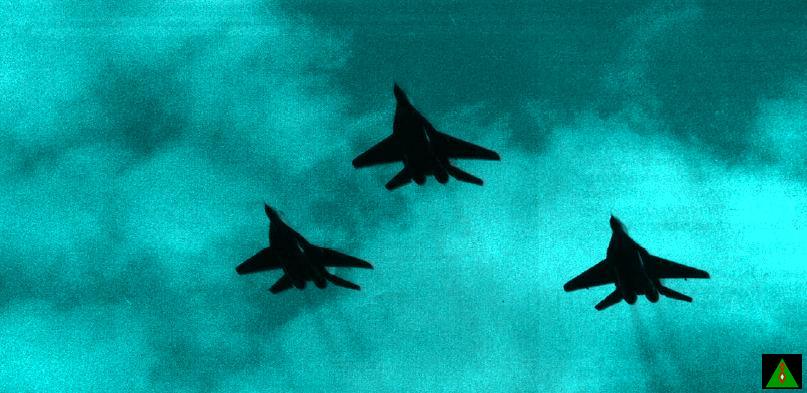"Both assessed successful," read one of the tweets.
Another said: "Tornado jets have carried out first air strikes in support of democratic Iraqi government."
It did not say when or where the strikes were carried out but explained they had aided Kurdish troops in the area.
"I can confirm that the RAF were in action today in support of the Iraqi government in northwest Iraq," Defence Secretary Michael Fallon said.
Fallon said the strikes against IS jihadists, who have seized huge swathes of Iraq and Syria in recent months, were carried out by two jets from an RAF base in Cyprus.
"They identified and attacked a heavy weapon position that was endangering Kurdish forces and they subsequently attacked an ISIL armed pickup truck in the same area," he said, using an alternative name for the Islamic State group.
According to Kurdish sources cited by the BBC, the strikes had helped the Kurds retake an "important border crossing" at Rabia, near Syria.
- Government would back Syria action -
The British parliament last week approved a motion to join in a US-led military campaign against IS jihadists operating in Iraq.
Tory minister Iain Duncan Smith on Tuesday revealed that both coalition government partners were also in favour of action against IS fighters in Syria, but that it was blocked by the opposition Labour party.
"There was absolute unity around the cabinet table, including the Liberal Democrats as well, all basically saying the same thing - that the complete package is ultimately having to deal with ISIL, not ISIL in one place," he said.
"We need to carry the House of Commons on these things and so the answer here is that Labour decided that frankly this was not a step they wanted to take, so it conditions what we are doing."
The strikes signal the start of Britain's latest military engagement in Iraq after it pulled out all its troops in 2011 following an eight-year conflict.
The government has said it will not send combat troops on the ground or join air strikes in Syria without further parliamentary approval.
British foreign minister Philip Hammond earlier on Tuesday said UK forces would not be "panicked" into dropping bombs in Iraq.
"When we do release our weapons we have to be absolutely sure that they are against ISIL targets, that they are not going to kill innocent Sunni Muslim civilians in areas that are occupied by ISIL," he told the BBC.
"Otherwise we are having the opposite of the effect we are intending to have," he said.
Asked about France joining the US-led coalition before Britain did, he said: "There is nobody who knows anything about air power who is suggesting that the French air force is a more formidable force than the RAF."
France has already carried out two rounds of air strikes.
The wife of a British taxi driver held by Islamic State jihadists renewed her appeal on Tuesday for her husband's release, saying that his captors were ignoring the "verdict of their own justice system".
Barbara Henning said that her husband Alan, who left the family home near Manchester in northern England to deliver aid to victims of Syria's civil war, had been "in the right place doing the right thing."
-----------------------------------------------------------------------------------------------------------------
Another said: "Tornado jets have carried out first air strikes in support of democratic Iraqi government."
It did not say when or where the strikes were carried out but explained they had aided Kurdish troops in the area.
"I can confirm that the RAF were in action today in support of the Iraqi government in northwest Iraq," Defence Secretary Michael Fallon said.
Fallon said the strikes against IS jihadists, who have seized huge swathes of Iraq and Syria in recent months, were carried out by two jets from an RAF base in Cyprus.
"They identified and attacked a heavy weapon position that was endangering Kurdish forces and they subsequently attacked an ISIL armed pickup truck in the same area," he said, using an alternative name for the Islamic State group.
According to Kurdish sources cited by the BBC, the strikes had helped the Kurds retake an "important border crossing" at Rabia, near Syria.
- Government would back Syria action -
The British parliament last week approved a motion to join in a US-led military campaign against IS jihadists operating in Iraq.
Tory minister Iain Duncan Smith on Tuesday revealed that both coalition government partners were also in favour of action against IS fighters in Syria, but that it was blocked by the opposition Labour party.
"There was absolute unity around the cabinet table, including the Liberal Democrats as well, all basically saying the same thing - that the complete package is ultimately having to deal with ISIL, not ISIL in one place," he said.
"We need to carry the House of Commons on these things and so the answer here is that Labour decided that frankly this was not a step they wanted to take, so it conditions what we are doing."
The strikes signal the start of Britain's latest military engagement in Iraq after it pulled out all its troops in 2011 following an eight-year conflict.
The government has said it will not send combat troops on the ground or join air strikes in Syria without further parliamentary approval.
British foreign minister Philip Hammond earlier on Tuesday said UK forces would not be "panicked" into dropping bombs in Iraq.
"When we do release our weapons we have to be absolutely sure that they are against ISIL targets, that they are not going to kill innocent Sunni Muslim civilians in areas that are occupied by ISIL," he told the BBC.
"Otherwise we are having the opposite of the effect we are intending to have," he said.
Asked about France joining the US-led coalition before Britain did, he said: "There is nobody who knows anything about air power who is suggesting that the French air force is a more formidable force than the RAF."
France has already carried out two rounds of air strikes.
The wife of a British taxi driver held by Islamic State jihadists renewed her appeal on Tuesday for her husband's release, saying that his captors were ignoring the "verdict of their own justice system".
Barbara Henning said that her husband Alan, who left the family home near Manchester in northern England to deliver aid to victims of Syria's civil war, had been "in the right place doing the right thing."
-----------------------------------------------------------------------------------------------------------------









 Home
Home Politics
Politics











